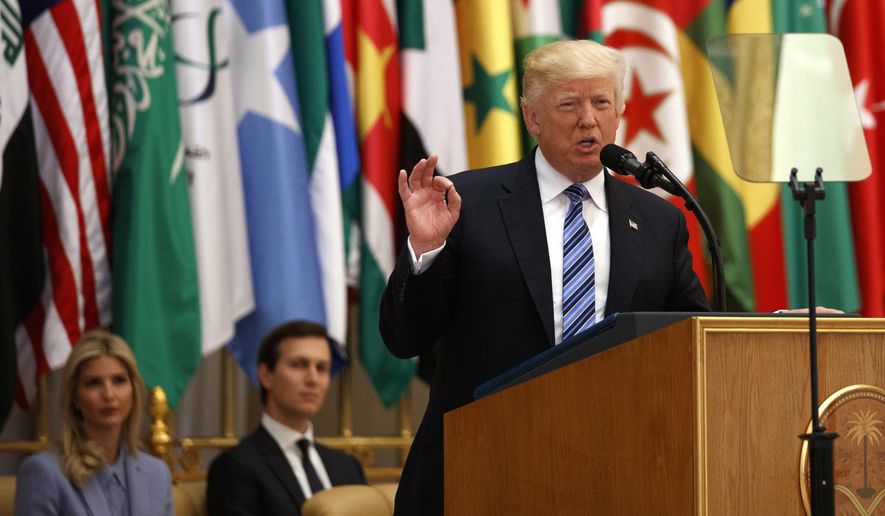Standing in the heart of the Muslim world Sunday, President Trump told leaders from across the Middle East and North Africa that it was up to them to rip out extremist Islam at its roots within their homelands.
In a historic speech, Mr. Trump vowed that the U.S. would be a strong partner in the fight against terrorism but that Muslim nations would have to lead the way by preaching religious tolerance and ferreting out extremists — even from within mosques and religious schools that often have received a free pass or blind eye.
“There can be no coexistence with this violence. There can be no tolerating it. No accepting it. No excusing it and no ignoring it,” the president said in Riyadh, Saudi Arabia. “They don’t worship God. They worship death.
“This is a battle between good and evil,” he told a gathering of 50 leaders from Muslim countries. “Our goal is a coalition of nations who share the aim of stamping out extremism and providing our children a hopeful future that does honor to God.”
Mr. Trump also called for a unified front to combat and isolate Iran, a common enemy of many in the room.
He delivered the speech on the second day of his first trip abroad as president, before heading to Israel and Vatican City in a journey aimed at uniting three major world religions and laying a foundation for Middle East peace talks.
Beginning the trip in Riyadh and laying out his vision at the Arab Islamic American Summit, the president demonstrated a dramatic break with the anti-terror and foreign policy of the Obama administration, which alienated many Muslim countries with the Iran nuclear deal, which they saw as emboldening Tehran.
The speech also provided a political win for Mr. Trump at home, where the news media focus shifted briefly from accusations and investigations of collusion with Russia.
However, Mr. Trump did not use the phrase “radical Islamic terrorism,” a phrase he harshly criticized President Obama for not using.
During the campaign, when Mr. Trump often used rhetoric that risked offending Muslims, he said Mr. Obama would never be able to defeat an enemy he refused to name.
Mr. Trump did refer to “Islamists” and “Islamic terror,” making clear the source of the extremism. But he stressed, as did Mr. Obama and President George W. Bush before him, that the U.S. was not at war with Islam.
“I stand before you as a representative of the American people to deliver a message of friendship and hope and love,” he said. “That is why I chose to make my first foreign visit a trip to the heart of the Muslim world, to the nation that serves as custodian of the two holiest sites in the Islamic faith.”
SEE ALSO: Donald Trump’s visit to Saudi Arabia sets new tone for international relations
The speech, which touched on sensitive topics for Muslims, appeared to be well-received.
Mr. Trump garnered an early endorsement from Saudi King Salman, who introduced him with a plea for unity in the fight against extremism.
“Our responsibilities toward God, our people and toward the entire world is to stand united to fight the forces of evil and extremism whatever their sources are,” King Salman said.
While Mr. Trump’s message was blunt and at times grim about the struggle against evil, the president delivered it with a tone of respect for the assembled leaders and optimism that they would prevail.
“We are not here to lecture. We are not here to tell other people how to live, what to do, who to be or how to worship,” said the president. “Instead, we are here to offer partnership — based on shared interests and values — to pursue a better future for us all.
“Every time a terrorist murders an innocent person and falsely invokes the name of God, it should be an insult to every person of faith,” he said.
The strategy Mr. Trump outlined included denying territory or safe havens for extremists and cutting off financial streams to groups associated with terrorism. He stressed that more than military action, a message of religious tolerance and anti-violence had to come from political and religious leaders in the Muslim world.
“It means standing together against the murder of innocent Muslims, the oppression of women, the persecution of Jews, and the slaughter of Christians,” said Mr. Trump. “Religious leaders must make this absolutely clear: Barbarism will deliver you no glory. Piety to evil will bring you no dignity. If you choose the path of terror, your life will be empty, your life will be brief, and your soul will be fully condemned.”
He continued: “And political leaders must speak out to affirm the same idea. Heroes don’t kill innocents; they save them.”
Turning words to action, Mr. Trump and King Salman agreed to establish the Terrorist Financing Targeting Center as a hub for efforts to counter terrorist fundraising.
In the U.S., former House Speaker Newt Gingrich compared Mr. Trump’s speech to President Reagan’s famous Westminster address to the British Parliament that set the stage for the defeat of the Soviet Union.
“You have the president of the United States surrounded by the largest alliance we’ve ever seen in the Muslim world, talking and articulating about a practical and realistic idealism they are going to move forward together to create a better world,” he said on Fox News. “Just as Reagan set at a key moment in the defeat of the Soviet empire, Trump is now setting the key moment in the defeat of terrorism.”
• S.A. Miller can be reached at smiller@washingtontimes.com.




Please read our comment policy before commenting.